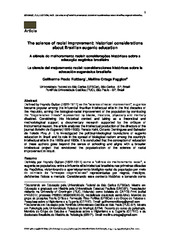| dc.contributor.author | Roitberg, Guilherme Prado | |
| dc.contributor.author | Faggion, Melline Ortega | |
| dc.coverage.spatial | Universidade Federal de São Carlos (UFSCar), São Carlos - SP | por |
| dc.date.accessioned | 2022-09-29T13:45:07Z | |
| dc.date.available | 2022-09-29T13:45:07Z | |
| dc.date.issued | 2021 | |
| dc.identifier | https://doi.org/10.14244/198271995348 | por |
| dc.identifier.citation | ROITBERG, Guilherme Prado; FAGGION, Melline Ortega. The science of racial improvement: historical considerations about Brasilian eugenic education. Revista Eletrônica de Educação, Universidade Federal de São Carlos (UFSCar), São Carlos - SP, v. 15, p. e5348076, 2021. Disponível em: https://repositorio.ufscar.br/handle/ufscar/16733. | * |
| dc.identifier.issn | 1982-7199 | por |
| dc.identifier.uri | https://repositorio.ufscar.br/handle/ufscar/16733 | |
| dc.description.abstract | Defined by Francis Galton (1822-1911) as the “science of racial improvement”, eugenics became popular among the influential Brazilian intellectual elite in the first decades of the Republic, aiming the biological-racial improvement of the population by combating the “degenerative threats” represented by blacks, mestizos, physically and mentally disabled. Considering this historical context and taking as a theoretical and methodological support a documentary research supported by the critique of instrumental reason, the article analyzes the intellectual production of the directors of the journal Boletim de Eugenia (1929-1933): Renato Kehl, Octavio Domingues and Salvador de Toledo Piza Jr. It is investigated the political-ideological foundations of eugenic education in Brazil and its role in the spread of biological racism among the country's intellectual elite in the 1920s and 1930s. It is concluded that the conception of education of these authors goes beyond the sense of schooling and aligns with a broader intellectual project that envisioned the popularization of the science of racial improvement in Brazil. | eng |
| dc.description.abstract | Definida por Francis Galton (1822-1911) como a “ciência do melhoramento racial”, a eugenia se popularizou entre a influente elite intelectual brasileira nas primeiras décadas da República, vislumbrando o aperfeiçoamento biológico-racial da população por meio do combate às “ameaças degenerativas” representadas por negros, mestiços, deficientes físicos e mentais. Considerando esse contexto histórico e tomando como aporte teórico-metodológico uma pesquisa documental amparada pela crítica da razão instrumental, o artigo analisa a produção intelectual dos diretores do periódico Boletim de Eugenia (1929-1933): Renato Kehl, Octavio Domingues e Salvador de Toledo Piza Jr. Investiga-se os fundamentos político-ideológicos da educação eugênica no Brasil e seu papel na difusão do racismo biológico entre a elite intelectual do país nas décadas de 1920 e 1930. Conclui-se que a concepção de educação desses autores ultrapassa o sentido de escolarização e se alinha a um projeto intelectual mais amplo que vislumbrava a vulgarização da ciência do melhoramento racial no Brasil. | por |
| dc.description.sponsorship | Coordenação de Aperfeiçoamento de Pessoal de Nível Superior (CAPES) | por |
| dc.format.extent | e5348076 | por |
| dc.language.iso | eng | eng |
| dc.publisher | Universidade Federal de São Carlos | por |
| dc.relation.ispartof | Revista Eletrônica de Educação | por |
| dc.rights | Attribution-NonCommercial-NoDerivs 3.0 Brazil | * |
| dc.rights.uri | http://creativecommons.org/licenses/by-nc-nd/3.0/br/ | * |
| dc.subject | Educação eugênica | por |
| dc.subject | Movimento eugenista | por |
| dc.subject | Racismo científico | por |
| dc.subject | Razão instrumental | por |
| dc.subject | Eugenic education | eng |
| dc.subject | Eugenic movement | eng |
| dc.subject | Scientific racism | eng |
| dc.subject | Instrumental reason | eng |
| dc.title | The science of racial improvement: historical considerations about Brasilian eugenic education | eng |
| dc.title.alternative | A ciência do melhoramento racial: considerações históricas sobre a educação eugenista brasileira | por |
| dc.type | Artigo | por |
| dc.publisher.initials | UFSCar | por |
| dc.publisher.program | Programa de Pós-Graduação em Educação - PPGE | por |
| dc.subject.cnpq | CIENCIAS HUMANAS::EDUCACAO | por |
| dc.subject.cnpq | CIENCIAS HUMANAS::HISTORIA | por |
| dc.description.sponsorshipId | Processo n°88887.569968/2020-00, Programa Institucional de Internacionalização da Coordenação de Aperfeiçoamento de Pessoal de Nível Superior (CAPES-PrInt) | por |
| dc.publisher.address | Câmpus São Carlos | por |
| dc.contributor.authorlattes | http://lattes.cnpq.br/3993968379492241 | por |
| dc.identifier.url | https://www.reveduc.ufscar.br/index.php/reveduc/article/view/5348 | por |
| dc.publisher.department | Centro de Educação e Ciências Humanas - CECH | por |
| dc.citation.volume | 15 | por |

